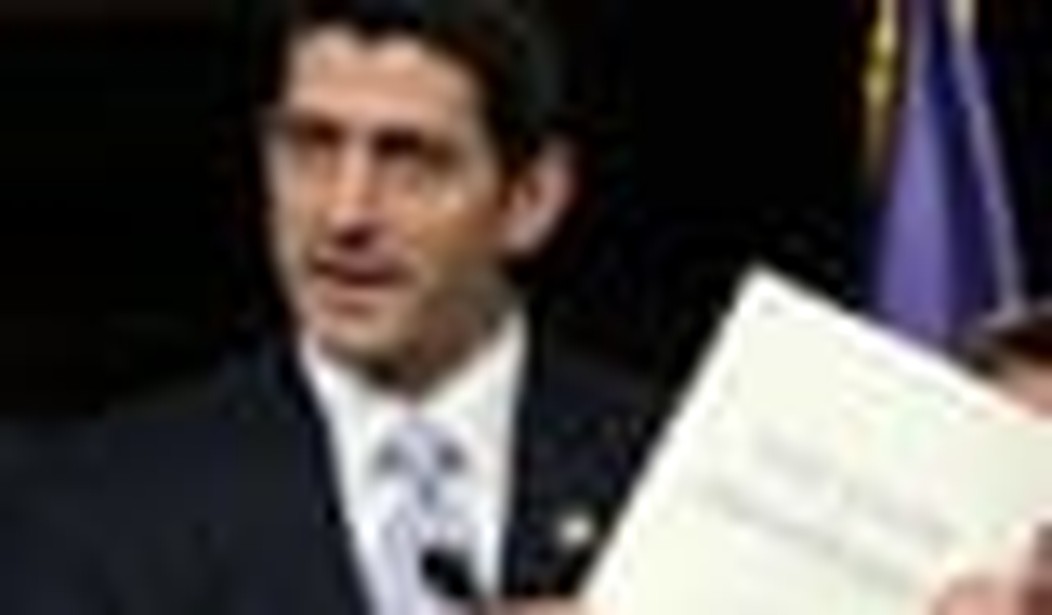Poor Paul Ryan. The lugubrious chairman of the House Budget Committee is spearheading the charge for the “Path to Prosperity,” a thoughtful, comprehensive, unflinching plan to address America’s looming and existential debt crisis.
“America is facing a defining moment,” Ryan wrote in the Wall Street Journal. “The threat posed by our monumental debt will damage our country in profound ways, unless we act.” Ryan’s plan would slash domestic spending, reform Medicaid and Medicare, overhaul the tax code, and, as a piece de resistance, repeal ObamaCare. These and other measures, he estimates, would cut spending $6.2 trillion over ten years and reduce deficits by $4.4 trillion, putting “the nation on a path to actually pay off our national debt.”
It breaks the heart, really. Ryan is a serious man with a serious plan; unfortunately, Americans are a thoroughly unserious people. The president, at least, knows this, and so on Wednesday didn’t even bother giving a serious speech on the debt, instead offering his usual mix of partisan boilerplate, empty cliché, and fiscal phantasmagoria.
Pay off the national debt? Good luck. Behold the disgusting display that unfolded last week in Washington; after endless haggling, a painful budget compromise emerged to cut a mere $38.5 billion in federal spending over the next six months. The non partisan Congressional Budget Office (CBO), however, estimates that the deal will result in actual savings of only $352 million, thanks to the accounting legerdemain at which Washington pols are so adept. Meanwhile, in the week leading up to this laughable deal, the federal debt increased $54 billion, according to the Treasury Department’s Bureau of Public Debt.
They say politics is the art of the possible, and perhaps House Republicans secured as much budgetary discipline as possible from Harry Reid’s Senate and President Obama’s White House. But therein lies the problem — what is now required to stave off fiscal collapse is beyond what is politically possible; the sacrifices necessary lay beyond what most politicians can ask of our citizens, and beyond what those citizens are prepared to offer.
Even today’s tea partiers are raging socialists compared to the hardy patriots of yore from whom they borrow their moniker. According to a recent CBS News/New York Times survey of tea party supporters, “62 percent say programs like Social Security and Medicare are worth the costs to taxpayers. (The figure is even higher among Americans overall, at 76 percent.)” And a WSJ/NBC News poll found: “Less than a quarter of Americans support making significant cuts to Social Security or Medicare to tackle the country’s mounting deficit….Even tea party supporters, by a nearly 2-to-1 margin, declared significant cuts to Social Security ‘unacceptable.'”
Such sentiments display a shocking ignorance of the cost and scope of these programs, which in fact represent a dagger poised at the very heart of our economy. Most Americans, it seems, are happy to dwell in deep delusion. When the crisis comes, many — perhaps most — will be shocked.
Paul Ryan will not be one of them. He is right when he says that we are approaching the most predictable financial crisis in history. But he is wrong when he says that America faces a defining moment — that moment came eight decades ago, when the New Deal began to drug our citizens with the government largess to which they are now hopelessly addicted. The time to act was then, or in the 1960s when the Great Society double-downed on the welfare state.
In 2011, Ryan’s proposal, which represents the bare minimum starting point to any serious discussion on the debt, is being demagogued as hopelessly radical, proof that Americans long ago decided what kind republic they wanted to have:
Short lived.
(Also see: “House approves Ryan’s ‘Path to Prosperity’ plan.”)









Join the conversation as a VIP Member